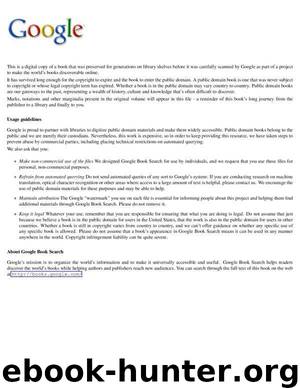PSYCHOLOGY OF THE UNCONSCIOUS by DR. C. G. JUNG

Author:DR. C. G. JUNG
Language: eng
Format: mobi
Published: 1916-03-24T16:00:00+00:00
The figures of the Miller dramas, being children of the creator's phantasy, depict, as is natural, those traits of character which belong to the author. The hero, the wish figure, is represented as most distinguished, because the
320 PSYCHOLOGY OF THE UNCONSCIOUS
hero always combines in himself all wished-for ideals. Cyrano's attitude is certainly beautiful and impressive; Cassius's behavior has a theatrical effect. Both heroes prepare to die effectively, in which attempt Cyrano succeeds. This attitude betrays a wish for death in the unconscious of our author, the meaning of which we have already discussed at length as the motive for her poem of the moth. The wish of young girls to die is only an indirect expression, which remains a pose, even in case of real death, for death itself can be a pose. Such an outcome merely adds beauty and value to the pose under certain conditions. That the highest sununit of life is expressed through the symbolism of death is a well-known fact; for creation beyond one's self means personal death. The coming generation is the end of the preceding one. This symbolism is frequent in erotic speech. The lasdvi-ous speech between Lucius and the wanton servant-maid in Apuleius (** Metamorphoses," lib. ii: 32) is one of the clearest examples:
" Proeliare, inquit, et fortiter proeliare: nee enim tibi cedam, nee terga vortam. Cominus in aspectum, si vir es, dirigc; et grassare naviter, et occide moriturus. Hodiema pugna non habet missionem.—Simul ambo corruimus inter mutuos amplexus aninutt anhelantes.'* *
This symbolism is extremely significant, because it shows how easily a contrasting expression originates and
* 'Tight/' she said, " and fight bravely, for I will not give away an inch nor turn my bacic. Face to face, come on if you are a man I Strike home, do your worst and die! The battle this day is without quarter . . • till, weary in bpdy and mind, we lie powerless and gasping for breath in each other's arms."
how equally intelligible and characteristic such an expression is. The proud gesture with which the hero offers himself to death may very easily be an indirect expression which challenges the pity or sympathy of the other, and thus is doomed to the calm analytic reduction to which Brutus proceeds. The behavior of Chiwantopel is also suspicious, because the Cassius scene which serves as its model betrays indiscreetly that the whole affair is merely infantile and one which owes its origin to an overactive mother imago. When we compare this piece with the series of mother symbols brought to light in the previous chapter, we must say that the Cassius scene merely confirms once more what we have long supposed, that is to say, that the motor power of these symbolic visions arises from an infantile mother transference, that is to say, from an undetached bond to the mother.
In the drama the libido, in contradistinction to the in-active nature of the previous symbols, assumes a threatening activity, a conflict becoming evident, in which the one part threatens the other with murder.
Download
This site does not store any files on its server. We only index and link to content provided by other sites. Please contact the content providers to delete copyright contents if any and email us, we'll remove relevant links or contents immediately.
The Art of Thinking Clearly by Rolf Dobelli(10489)
The 5 Love Languages: The Secret to Love That Lasts by Gary Chapman(9815)
Mindhunter: Inside the FBI's Elite Serial Crime Unit by John E. Douglas & Mark Olshaker(9342)
Becoming Supernatural by Dr. Joe Dispenza(8217)
Nudge - Improving Decisions about Health, Wealth, and Happiness by Thaler Sunstein(7706)
The Road Less Traveled by M. Scott Peck(7603)
Mastermind: How to Think Like Sherlock Holmes by Maria Konnikova(7347)
Enlightenment Now: The Case for Reason, Science, Humanism, and Progress by Steven Pinker(7313)
Win Bigly by Scott Adams(7197)
The Way of Zen by Alan W. Watts(6614)
Factfulness: Ten Reasons We're Wrong About the World – and Why Things Are Better Than You Think by Hans Rosling(4742)
The State of Affairs by Esther Perel(4719)
Gerald's Game by Stephen King(4654)
Man's Search for Meaning by Viktor Frankl(4606)
The Confidence Code by Katty Kay(4260)
Thinking in Bets by Annie Duke(4227)
The Healing Self by Deepak Chopra(3578)
Hidden Persuasion: 33 psychological influence techniques in advertising by Marc Andrews & Matthijs van Leeuwen & Rick van Baaren(3565)
The Worm at the Core by Sheldon Solomon(3487)
